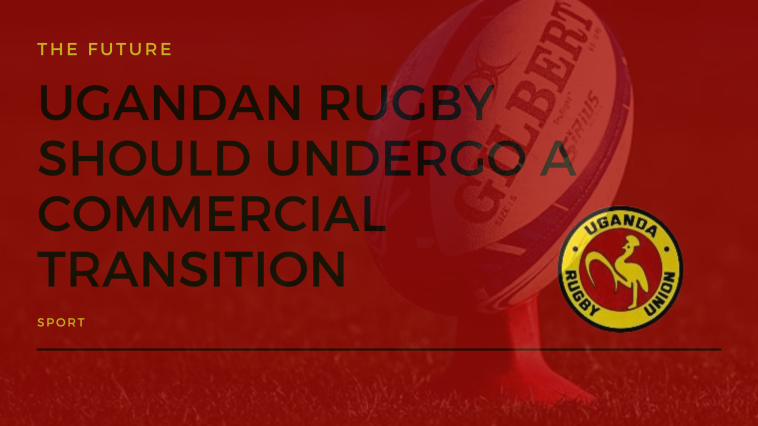Rugby in Uganda and many parts of the world remains predominantly an amateur sport, often associated with specific communities proficient in English or French. The ongoing Rugby World Cup in France can easily hold geopolitical implications in the context of global developments.
Over the past three decades, sports have evolved from amateur pursuits to lucrative professional ventures, coinciding with the establishment of the Rugby World Cup. Today, sports organizations face crucial choices: emulate the successful fitness culture of English football or American basketball or uphold their traditional values, history, and voluntary principles, as seen in Uganda. This evolution has led to conflict between these two sporting traditions for market share, political support, and the future of amateur sports.
To prevent Ugandan Rugby from falling behind in this transition, the commercial aspect of the sport must at some point supersede the technical front, you can’t play with no money all the time. Contemporary sports are global products with vast commercial potential, often attracting substantial investments from commercial companies, even before state involvement.
The commercial facet of sports is akin to any other industry, influenced by commerce, trade, and industry. In Rugby right from Uganda Rugby Union to regional associations that make up URU and clubs that make up the regions’ commercial is reduced or obscured with media and the basic parts. In a professional setting commercial fronts are supposed to make sense and the Golden Triangle concept is supposed to be employed. Sponsorship, sport, and media make up the triangle. The underlying significance of the Golden Triangle is each side of the triangle benefits from the other side, hence each side is dependent on the other side and it takes a financial or promotional form at the end of the day.
The key question here is how Ugandan rugby can establish a credible commercial front, potentially becoming a model for World Rugby, akin to the Golden Triangle. The Uganda Rugby Union could consider establishing a think-tank or research department tasked with creating a blueprint for organizational structures within regional associations and clubs that are more of startups in fashion and operations.
This blueprint could involve assisting clubs and regional associations in setting up departments for sports event planning, public relations, media coverage (including television, digital media, and social platforms), sports agencies for talent identification and player management, sports psychologists for mental health, joint medical wings for player safety, data centers for statistics, marketing managers, and legal departments. Additionally, fashion specialists could work with local manufacturers for kit procurement.
The ultimate goal of these departments should be mutual benefit, where the commercial department, for instance, comprises members from regional associations and clubs, sourcing bank sponsors whose contributions benefit all clubs. This collaborative approach has the potential to significantly boost resources for rugby and create a mutually beneficial ecosystem, similar to the success of the NFL which is more boring compared to the blood rush rugby gives to its fanatics.
While Ugandan Rugby has secured a television deal, its full potential cannot be realized without effective public relations and kit procurement departments. Commercialization of sports worldwide has allowed local businesses to support teams by providing uniforms and becoming sponsors, significantly enhancing the sport’s reach.
With well-established organizational structures, resource lobbying becomes more accessible, and these resources can be effectively managed and multiplied. They can then be reinvested in the sport to generate more revenue, potentially allowing retired players to find new careers as coaches, podcasters, or research authorities.
For instance, while rugby currently has a beer sponsor that provides free beer to players and stakeholders, it remains uncertain whether this sponsorship creates lasting benefits beyond immediate gratification. A detailed white paper, facilitated by a research department, could explore this issue. It’s a very good beer though on the tongue. But at a later point someone gets hooked to the beer brand, they will drink the beer even away from rugby meeting a facet of the golden triangle for the beer sponsor.
As amateur rugby transitions toward professionalism, the community should track the impact of revenue flows over time. The establishment of a robust commercial front is essential not only for the sport’s sustainability but also for encouraging parents to support their children’s involvement in rugby, even as doctors or accountants, recognizing the potential economic opportunities in a developing country going beyond a sport.
As clubs establish robust systems, a scenario may arise where companies compete to secure sponsorship deals. Regional unions could seize the opportunity to monetize merchandise sales, offering rights to companies for various items. While it might be considered an unpopular opinion, rugby may eventually explore partnerships with the gambling and betting sectors to diversify revenue streams.
The Uganda Rugby Union (URU) should actively encourage its members to strategically acquire land for sports grounds. These facilities can not only be utilized for rugby but also rented out to other sports, creating an additional revenue stream. Furthermore, URU can explore naming rights agreements for these venues. This approach allows long-standing supporters of rugby, who have invested significant time and resources, to reap tangible benefits beyond the satisfaction of philanthropy.
This post was created with our nice and easy submission form. Create your post!






